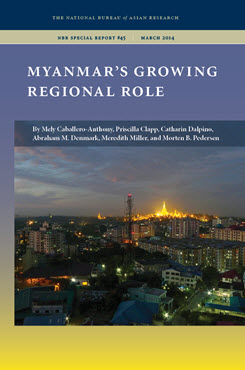Myanmar's Re-emergence (Introduction)
This is the introduction to the report “Myanmar’s Growing Regional Role.
Myanmar is a nation consumed with its own evolution. After decades of authoritarianism and self-imposed isolation, the country has begun to reform its politics at home and open up to the outside world. Though still precarious, domestic political and economic reforms have already begun to enable Myanmar’s people and institutions to interact with their foreign counterparts in ways that would have previously been impossible. As Myanmar re-emerges onto the world stage, the potential for it to play a larger role in global economic and political affairs is significant.
Prior to its shift toward isolation, Myanmar was a major player in the politics of South and Southeast Asia and the developing world more broadly. Active in the formation of the Non-Aligned Movement and bolstered by its strategic geographic position and wealth of natural resources, the country was able to punch above its weight in international affairs. With its experiment in military authoritarianism hopefully coming to a close, Myanmar is poised to re-emerge as a significant regional player.
A major step in this process has been Myanmar’s assumption of the chair of the Association of Southeast Asian Nations (ASEAN) for 2014 after being passed over for the chairmanship in 2005. This signaled to the world that the country was prepared to interact with the region in a more robust and serious fashion. Yet Myanmar’s chairmanship, as with so many of the country’s foreign policy decisions, will be primarily driven by domestic political factors. Specifically, Naypyidaw views chairing ASEAN as an opportunity to demonstrate to domestic audiences the international support for, and tangible benefits of, its political and economic reforms.
These domestic motivations echo a theme that reverberates throughout this study. Time and again, Myanmar’s approach to foreign affairs has been significantly (and often primarily) shaped by domestic political and economic considerations. While this is not necessarily different from the formation of foreign policies by other nations, the unique state of reform and opening in which Myanmar finds itself today lays these motivations bare to the world. Decades of isolation have significantly depleted Myanmar’s cadre of foreign policy professionals, leaving only a few dozen technocrats able to understand and articulate strategic and geopolitical rationales for foreign policy decision-making. Most often, domestic politics and economic needs are explicitly given as reasons for foreign policy behavior.
Yet much remains to be understood about the role that Myanmar can play in the region, the role it seeks to play, and the forces that will pull it in various strategic directions. To better understand these issues, the National Bureau of Asian Research (NBR), with the support of the Henry Luce Foundation, has gathered a team of experts to analyze various aspects of Myanmar’s re-emergence. This team visited Myanmar in October 2013 for meetings with political, economic, and foreign policy actors in Yangon and Naypyidaw. In this NBR Special Report, Priscilla Clapp, a senior adviser to the Asia Society and the United States Institute of Peace and a former U.S. Foreign Service officer, writes about the influence of domestic issues on Myanmar’s foreign policy. Next, Catharin Dalpino, a contract course chair at the State Department’s Foreign Service Institute and a former deputy assistant secretary of state, examines the prospects for U.S.-Myanmar relations. Mely Caballero-Anthony, head of the Centre for Non-Traditional Security Studies at the S. Rajaratnam School of International Studies and a former official at ASEAN, discusses Myanmar’s chairmanship of ASEAN. Morten Pedersen, a senior lecturer at the University of New South Wales in Canberra, then analyzes how Myanmar’s policy elites think about the country’s foreign policy during the current time of transition. Abraham M. Denmark, vice president for political and security affairs at NBR, examines Myanmar’s relations with Asia’s major powers—China, India, and Japan. Finally, Meredith Miller, senior vice president for trade, economics, and energy affairs at NBR, considers the economic and trade issues related to Myanmar’s re-emergence.
Myanmar’s chairmanship of ASEAN is certainly focused on the progression toward ASEAN’s goals, but it is also concerned with the country’s own development as a foreign policy actor. The six essays in this report all point to the long road ahead for Myanmar’s political and economic evolution. Through its chairmanship, Myanmar will gain the profile and experience of leading ASEAN, as well as the dialogue partners that it has for so long lacked. However, the real determinant of the country’s future international standing will be the new government’s leadership at home in building the economic and political framework that will allow Myanmar to play a stronger role in regional affairs in the decades to come.


